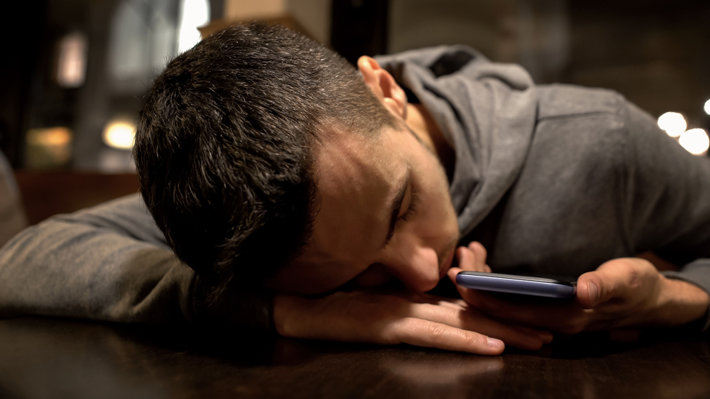Social Media Exposes Kids to Drug Content—Parents Need to Educate Their Kids About Drugs

It is easy enough to see that social media has taken the world by storm in the last decade and a half. Social media has become a sudden, seemingly omnipresent force in the lives of just about every American.
While social media has changed the way humans interact, there have been downsides to it. For example, young people now have ways to learn about drugs from their peers without even having to spend time with their peers in real-time. That makes the risks of peer pressure much greater, making it even more critical that parents talk to their kids about drugs.
Parents Need to Educate their Kids
About Drugs
Parents need to talk to their kids about drugs. It does not work to adopt the perspective of, “Maybe if we just don’t discuss it, it will never be an issue for us.” That approach wasn’t practical to begin with, and considering how much drug abuse has spread through society, it certainly isn’t adequate now.
Tips for parents include:
- Parents must educate themselves first. Parents who do not know much about drugs will not be as effective in discussing the subject with their children. Parents should educate themselves first, and then talk to their kids about drugs.
- Experts liken talking to kids about drugs as having a similar effect as immunizing children from contracting measles. Having repeated discussions with children about drugs drastically lowers their chances of ever experimenting with such substances. Parents can talk to their kids about drugs as early as they feel comfortable with. Some parents talk to their children about drugs as early as preschool.
- The conversation will change as the child ages. Talking to a preschooler about drugs will look very different than talking to a teenager. For a preschooler, the discussion will mostly be as simple as telling the child to avoid certain medicines and drugs they may find within the home. For a teenager, on the other hand, issues of morality, the legal risks, overdose risks, and combating peer pressure are all factors that should be worked into the conversation.
- Revisit the conversation on peer pressure. Especially for middle school-age and high school-age students, being peer pressured into using drugs or experimenting with alcohol will likely be the first exposure a young person has to such substances. Parents should act out scenarios with their kids and go over ways their kids can safely extricate themselves from such situations.
- Experts also recommend using ”teachable moments,” e.g., day-to-day moments in interacting with one’s children where a scenario, story, circumstance, anecdote, movie, news story, or other happenstance creates a moment in which a parent could naturally and smoothly transition the conversation into one about drugs and alcohol.
- Research, research, research! Parents should sit down with their kids and use the internet to look up drug facts, death statistics, addiction statistics, short-term and long-term effects of drug use, and the civil and legal implications of using drugs. This is true for legal, pharmaceutical drugs too (like Benadryl), not just illicit drugs. The more young people understand the consequences of drug use, the less likely they’ll be to use drugs.
The “Benadryl Challenge”

Parents’ urgency to teach their kids the truth about drugs has never been more prominent than it is now. It’s easy enough to see why. Dangerous drug-related trends will sometimes become so popular among young people that they make national news. This happened recently with a social media challenge called the ”Benadryl Challenge.” As sad as it is, the Benadryl Challenge is an excellent example of why it is so important that parents educate their sons and daughters about drugs and alcohol.
The Benadryl Challenge is an internet dare, a challenge gone viral on the popular social media app Tik Tok. The Benadryl Challenge urges young people to overdose on Benadryl and record the effects of the overdose on video.
As of early September 2020, one 15-year-old girl had already suffered a fatal overdose while attempting the challenge. Other OD cases have occurred where teens had to be rushed to the hospital.
Warning labels on Benadryl bottles clearly state that children should not be given more than one dose in a four to six-hour period. Adults should not receive more than two doses during the same period, and no one should take more than six doses in 24 hours.
However, the Benadryl Challenge acts as a social media-boosted peer pressure influence. Reports indicate that teens have been encouraged to take as much as 12 Benadryl tablets at once, a potentially lethal dose.
“Engaging in such a challenge is inherently dangerous and can be fatal. In light of these and other risky social media challenges, it’s vital that parents monitor their teens’ social media activity.”
According to emergency medicine physician Dr. Robert Glatter, “Escalating doses can be deadly. As you approach the dose that leads to hallucinations that the ’challenge’ calls for, the risk for seizures and deadly cardiac arrhythmias significantly increases. Increasing doses of Benadryl typically lead to sleepiness, confusion, vomiting, agitation, elevated heart rate, which can precipitate a cardiac arrhythmia as well as a seizure. Engaging in such a challenge is inherently dangerous and can be fatal. In light of these and other risky social media challenges, it’s vital that parents monitor their teens’ social media activity.”
Considering how popular the Benadryl Challenge has gotten, parents should be on the lookout for overdose symptoms such as:
- Excessive body heat and a skin flush. General overheating and fever-like symptoms.
- A decrease in both sweating and urination.
- Changes in vision, including changes in pupil size and an inability to focus.
- Delirium. Feeling like one is “spinning.” Hyper-awareness. Anxiety.
Though it is just one example, the Benadryl Challenge is a painful reminder of what could happen to one’s own child. However, when parents teach their kids the truth about drugs, they make an effective move towards raising children who will never experiment with such substances.
Drug Education and Prevention Resources
One of the most successful methods of preventing a family member from falling prey to an addiction to drugs and alcohol is to ensure that families get educated about drugs and alcohol.
Once someone has fallen prey to addiction, it is next to impossible for them to get off of drugs and alcohol on their own. Their substance of choice has become their coping mechanism, their psychological and behavioral “tool” for facing life. And on top of that, they have likely developed a chemical dependence to the substance as well. That’s why one of the purposes of Narconon is to help families and communities better protect themselves from growing drug problems by providing educational materials and prevention resources.
It’s much easier to prevent addiction from ever happening than it is to get off of drugs and alcohol once one is hooked. Make sure you and your family members are well-informed about drugs and alcohol.
Sources:
- https://kidshealth.org/en/parents/talk-about-drugs.html
- https://www.drugabuse.gov/publications/marijuana-facts-parents-need-to-know/talking-to-your-kids-communicating-risks
- https://drugfree.org/article/prevention-tips-for-every-age/
- https://www.usnews.com/news/health-news/articles/2020-09-11/tiktok-benadryl-challenge-has-killed-at-least-one-teen
Reviewed and Edited by Claire Pinelli, ICAADC, CCS, LADC, RAS, MCAP


 ®
®